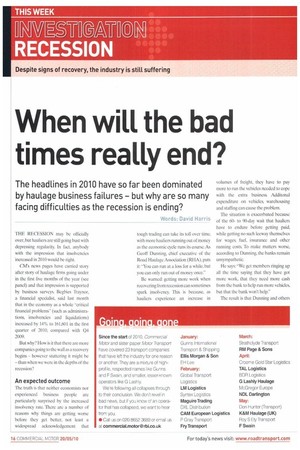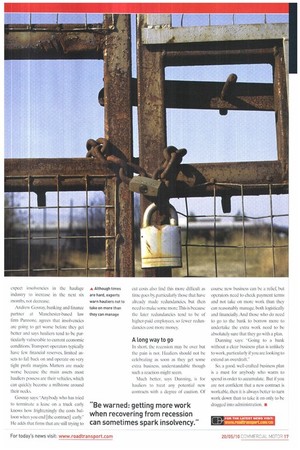When win the bad times really end?
Page 16

Page 17

If you've noticed an error in this article please click here to report it so we can fix it.
The headlines in 2010 have so far been dominated by haulage business failures but why are so many facing difficulties as the recession is ending?
Words: David Harris
THE RECESSION may be officially over, but hauliers are still going bust with depressing regularity, In fact, anybody with the impression that insolvencics increased in 2010 would be right.
CM's news pages have carried story after story of haulage firms going under in the first five months of the year (see panel) and that impression is supported by business surveys. Begbies Traynor, a financial specialist, said last month that in the economy as a whole "critical financial problems" (such as administrations, insolvencies and liquidations) increased by 14% to 161,601 in the first quarter of 2010, compared with 04 2009.
But why? How is it that there are more companies going to the wall as a recovery begins — however stuttering it might be —than when we were in the depths of the recession?
An expected outcome
The truth is that neither economists nor experienced business people are particularly surprised by the increased insolvency rate. There arc a number of reasons why things are getting worse before they get better, not least a widespread acknowledgement that tough trading can take its toll over time, with more hauliers running out of money as the economic cycle runs its course. As Geoff Dunning, chief executive of the Road Haulage Association (RHA), puts it: "You can run at a loss for a while, but you can only run out of money once."
Be warned: getting more work when recovering from recession can sometimes spark insolvency. This is because, as hauliers experience an increase in volumes of freight, they have to pay more to run the vehicles needed to cope with the extra business. Addi tonal expenditure on vehicles, warehousing and staffing can cause the problem.
The situation is exacerbated because of the 60to 90-day wait that hauliers have to endure before getting paid, while getting no such leeway themselves for wages, fuel, insurance and other running costs. To make matters worse, according to Dunning, the banks remain unsympathetic.
He says: "We get members ringing up all the time saying that they have got more work, that they need more cash from the bank to help run more vehicles, but that the bank won't help."
The result is that Dunning and others expect insolvencies in the haulage industry to increase in the next six months, not decrease.
Andrew Gosnay, banking and finance partner at Manchester-based law firm Pannone, agrees that insolvencies arc going to get worse before they get better and says hauliers tend to be particularly vulnerable to current economic conditions. Transport operators typically have few financial reserves, limited assets to fall back on and operate on very tight profit margins. Matters are made worse because the main assets most hauliers possess are their vehicles, which can quickly become a millstone around their necks.
Gosnay says; "Anybody who has tried to terminate a lease on a truck early knows how frighteningly the costs balloon when you end [the contract] early' He adds that firms that are still trying to cut costs also find this more difficult as time goes by, particularly those that have already made redundancies, but then need to make some more.This is because the later redundancies tend to be of higher-paid employees, so fewer redundancies cost more money.
A Long way to go
In short, the recession may be over but the pain is not. Hauliers should not be celebrating as soon as they get some extra business, understandable though such a reaction might seem.
Much better, says Dunning, is for hauliers to treat any potential new contracts with a degree of caution. Of course new business can be a relief, but operators need to check payment terms and not take on more work than they can reasonably manage. both logistically and financially. And those who do need to go to the bank to borrow more to undertake the extra work need to be absolutely sure that they go with a plan.
Dunning says: "Going to a bank without a clear business plan is unlikely to work, particularly if you are looking to extend an overdraft.
So, a good, well-crafted business plan is a must for anybody who wants to spend in order to accumulate. But if you are not confident that a new contract is workable. then it is always better to turn work down than to take it on only to be dragged into administration. •








































































































































































